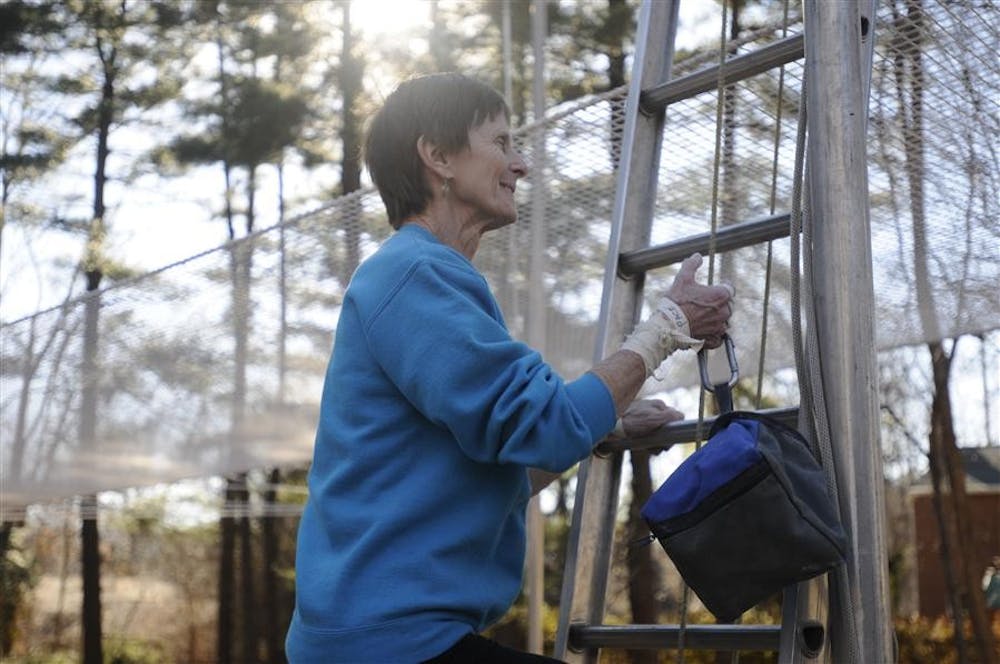On a pedestal 30 feet in the air, the trapeze artist prepares to perform the penny drop.
Bernadette Pace blocks out the chattering audience below and repeats a silent prayer.
“You’ve done this before. Just do it right. Just do it right. Just do it right.”
She adjusts the tape guards around her wrists and dusts her hands with chalk. She steps to the edge of the pedestal and reaches for the bar of her swing, balancing on the balls of her feet. The breeze fans her pixie haircut.
“It’s a perfect day for flying,” Bernadette says softly.
After four decades on the trapeze, she is no longer afraid. In the air, the aches of a lifetime fade. The world falls away.
Her eyes stare straight ahead at the catcher swinging back and forth on his own bar. She wipes her lips on the inside of her T-shirt — a habit so ingrained she can’t recall where it came from — and announces her trick.
“OK,” Bernadette calls out to the catcher. “I’ll go for that penny drop.”
“Penny drop,” he confirms.
Suspended by his legs, the catcher faces her upside down, slicing through the air toward her.
“Hup,” he yells at the height of his arc.
Bernadette leaps from the pedestal, dangling from the swing. Swinging back and forth, she hooks her knees over the bar and hoists herself into a sitting position.
“Just do it right. Just do it right. Just ... ”
She arches backward, lets go of the bar and flips underneath. She soars.
***
At age 67, Bernadette Pace has finally found her peace, midair.
Long ago, she left her past on the ground below. In the most unlikely job shift possible, she traded in a career as a ground-breaking biochemist for a life in the circus.
Moving from the lab to the trapeze, she transcended the fallout of a failed marriage and a troubled daughter and found her passion. Three stories up, she acquired the control that it takes to let go. She didn’t just pick herself up. She flew.
Before she discovered the trapeze, Bernadette was a girl from Edinburgh, Ind. Science intrigued her. She wanted to understand the makeup of the world at the molecular level. After completing her Ph.D. in biochemistry at the University of Illinois, she joined a research lab in Colorado that was devoted to unlocking the mechanics of ribosomal RNA, the microscopic nucleoproteins that read genetic code inside the cell and then synthesize proteins. She and her colleagues discovered parallels in the RNA of every organism ever found on the Earth, from ancient bacteria to corn to human beings. Their research laid the foundation for DNA sequencing. She was the first person in the world, she says, to synthesize a universal ribosomal RNA sequence.
It was in that laboratory that she worked alongside her husband. His name was Norman. He left her on a Saturday.
They met in high school and were married for 28 years. They moved from Illinois to Colorado to Indiana. In the lab, they worked together to discover the commonalities of every species on Earth. At home, they had a baby. They named her Elizabeth.
She thought they were supposed to be together forever. One morning he woke up and wanted a different life.
“He told me he loved me as he always had,” she says. “But he felt that he didn’t owe me the second half of his life.”
She says he wanted another house and another woman. He wanted to start over.
So he packed up his research and three decades of memories and walked out the door.
“For a while I got up, I got dressed and I acted normal,” she remembers. “But I wasn’t normal.”
After a year of pretending, Bernadette reclaimed her life. Twenty years before her marriage fell apart, she had gotten a membership at the Denver YMCA to help lose some baby weight. She says she was hoping to do some running before she discovered they offered trapeze lessons.
At first, she hesitated. The height and the risk scared her. Finally, she recognized the only way to overcome that fear was to climb the ladder and jump from the pedestal.
She would swing back and forth a few times, let go and fall safely to the net. Then she climbed back up and stepped off the edge again. She never missed a single one of the biweekly sessions. She realized she couldn’t live without the trapeze. When her marriage fell apart, she took refuge in the air.
“It doesn’t matter what problems you have,” she says. “When you’re flying, they’re gone.”
***
Bernadette rockets across open space. The lawn below, studded with open-mouthed spectators, disappears. All that’s left is her and the open sky.
“Keep your legs together,” she tells herself. “Arch your back.”
Through the years she has done everything she can to make her penny drop as elegant as possible. A trick, she says, is meaningless if it isn’t beautiful. Five days a week of muscle maintenance exercises have kept her core and joints stable. The practice, the dieting, the workouts — they all come down to this moment as she hurtles toward the catcher.
She knows the trick takes a total of 11 seconds. From the moment she lets go of her swing, it should take less than two seconds for her to reach the catcher.
The two of them are hurtling toward each other. She aims directly for his arms.
A net waits below. Just in case.
***
When her husband left, Bernadette was 50. It was too painful to continue with the research they had started together, so she abandoned biochemistry and made trapeze her life.
She joined a group called the Flying Españas and traveled around the country with the Royal Hanneford Circus. Two years later, she left the Españas for the Flying Valentines. For the first time in years, she felt free.
She perfected a repertoire of tricks — the bird’s nest, the back uprise, the shoot over. But her signature move became the penny drop. She’s not sure why it’s called that, but she says she knows it was adapted from a gymnastics move performed on the uneven bars.
Several years after joining the circus, Bernadette received a phone call from her daughter Elizabeth, who by then was living in Austin, Texas. Elizabeth explained that she was no longer able to care for her two young daughters, Isabelle and Carmen.
Elizabeth had struggled with drug addiction since high school. Now it was interfering with her ability to be a good mother. She asked her mother if the girls could move in with her.
A judge in Austin granted full custody of the girls to Bernadette.
“I never meant to keep them that long,” she says. “I thought that Elizabeth would get better and get them back. When the judge asked me if I was ready to give up the next 20 years of my life, I knew that wasn’t going to happen.”
Bernadette moved the girls to Indiana. Elizabeth called her daughters frequently, and for a while it seemed like she was getting better, getting straight. Bernadette even allowed Elizabeth to visit.
While Elizabeth was staying with them in Indiana, Bernadette went to give 3-year-old Carmen a bath. When Bernadette entered the bathroom she saw the countertop was covered with used syringes. She knew the girls weren’t safe with their mother.
That was 10 years ago. Bernadette is still the guardian and full-time parent to Isabelle and Carmen, now 16 and 13. They share a cozy, secluded ranch house in Bloomington. The walls are covered in photos from Bernadette’s travels with the Flying Españas and the Flying Valentines, showing her beaming in a red-sequined minidress and matching feathered headpiece. Isabelle and Carmen’s framed school photos crowd the mantle. There’s not a single year missing, from kindergarten to now.
Bernadette keeps remnants of her old life in a cabinet in the kitchen. When a visitor asks her one day to explain her work as a biochemist, she unearths a wrinkled manila folder from the wooden box and spreads charts and diagrams across the kitchen table. By now these pages are yellowed and faded. But for a moment, she is a scientist again. As she talks about the RNA structures, the sequencing, the discoveries she shared in, she leans forward and describes all the satisfactions of those years. She places one chart on the table — a page showing the tree of life — and lays her fingers over the branches. On each finger she points out the genera of the world.
Archaea.
Bacteria.
Eukarya.
Entamoeba.
Chloroflexus.
She scoops up her past, puts it in the folder and files it back in the cabinet. A lengthy grocery list that had been trapped under the folder is now visible.
Lettuce.
Apples.
Watermelon.
Tomatoes.
Carrots.
She’s making a salad for dinner. The girls try to get her to buy Oreos, but she won’t. She enjoys a healthy diet and wants them to do the same.
On Saturday nights, Bernadette listens to Prairie Home Companion on National Public Radio. She says she likes the sound of the violin and the flute. Her hearing has faded, but the high pitches of those instruments ring clearly in her ears. Chocolate doesn’t tempt her, and alcohol leaves her cold. She doesn’t care about finding a man.
“You don’t need any man,” Isabelle and Carmen tell her. “You’ve got us.”
In the back yard of their house sits a flying trapeze. During the summers, friends come to their house every day to practice. They go up for a few hours and work out new tricks. For Bernadette, it’s heaven.
Ebeth Feldman was a student at IU when she first met Bernadette. She found a want ad on campus encouraging anyone interested in trapeze to come to Bernadette’s house to try it out. Ebeth has been flying with her mentor ever since.
“She always says you can do it, just go for it, just try it,” she says. “If you mess up she never gets mad. She just gives you advice and says ‘try this’ instead.”
From time to time, Bernadette’s granddaughters join her on the trapeze. Carmen enjoys the rush of the wind on her face while swinging from the bar. Isabelle is interested in learning to master some of her Gram’s moves. One trick she’s learning is the penny drop.
Bernadette tells them the importance of warming up before performing. The key, she says, is to completely commit to a trick. Once you leap, there’s no
turning back.
***
“Arch your back,” she prays. “Arch, arch, arch ... .”
Her hands meet the catcher’s with a gentle clap. The catcher grips her wrists as they sway away from the platform, seemingly weightless. She is filled with elation.
They swing back and the catcher lets go of Bernadette’s wrists in midair. She twists to catch her bar, swinging back within reach.
“Where is the bar going to be?” she thinks. “High or low? Where is it going to be?”
It’s low. She falls a little and catches the bar. She swings back to the pedestal and lands perfectly on her feet. A glorious smile radiates across her face.
She grins at the catcher, silently thanking him. Now she hears the crowd erupting below with cheers. The world comes back into focus.
Learning to fly
Bloomington woman finds peace, new life on trapeze

Get stories like this in your inbox
Subscribe





